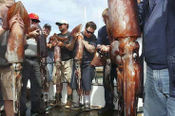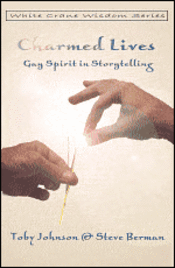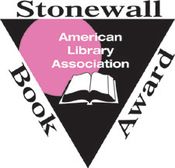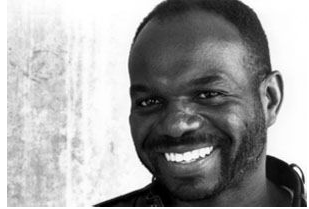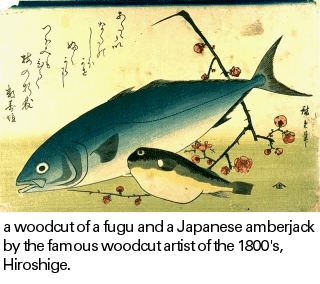Dana Rene Bowler, Ventura County Star / AP
Living on Air
 I wanted to share this picture.
I wanted to share this picture.
This is one of those "air plants" my partner and I picked up at the Brooklyn Botanic Gardens, our local gem. Though you can’t see it in this picture (and be sure to click on it to see it enlarged), it isn’t sitting in any soil whatsoever (it is in the window, on the sill, of our shower). It sits on top of the wood chips that cover the roots of another plant we have in the bathroom, an orchid plant.
This morning, for the sixth time, the purple "protuberance,"…erection, if you will…you see on the right, has pushed it’s way up and out of the ensiform, or sword-shaped "structure" (iris leaves are "ensiform"…and I’m not sure if this is a flower or the purple bloom is the flower…) that sits on the gray, woody stalk of the air plant. I may be mistaken, but I believe this plant is either a bromeliad, or closely related to them.
The technical name for the air plant and bromeliads are "epiphytic plants," amazing because they do not require soil to grow. Because there is no soil, watering is, in the main, via humidity. If you visit the Brooklyn Botanic Garden, (and I highly recommend it and the Steinhardt Pavilions where there are bonsai in what they call the Starr Bonsai Museum that are more than 125 years old and very lovely botanical art downstairs) which we do almost weekly, you can see these plants hanging in mid-air in the orchid pavilion, plants to which they are also related.
Air plants derive their nutrition from the air, rain water nutrients and decomposing matter (mostly leaves and dead insects) that may be caught among their air roots or in their leaves. Another incredible example, epiphytic plants absorb nitrogen in the air produced by lightning! In the wild, most epiphytic plants are attached to tree bark as a brace but do not in any way feed off the tree.
Anyway…every time it blossoms it is amazing to me, and I wanted to share it and preserve it in some way. Each of the individual components of this ensiform structure has had one of these beautiful purple blooms, tipped with the tiny plume.
We’ve also had pretty good luck with passion flowers actually fruiting! This is the flower we got on the right, and a picture of the fruit on the left: 

Filipino Thriller Video
A Filipino prison re-enacts Michael Jackson’s "Thriller Video."
One of the strangest things I’ve seen of late . . .
Congratulations to Toby Johnson and Steve Berman
We get letters because we have….Charmed Lives.
Greetings on behalf of the American Library Association’s
Gay, Lesbian, Bisexual and Transgender Roundtable’s Stonewall Book Awards. As a member of the Stonewall Book Award Committee Jury, I am seeking review copies of books being considered for the 2008 award.
We are very pleased to inform you that CHARMED LIVES: GAY SPIRIT IN STORYTELLING, edited by Toby Johnson and Steve Berman, has been recommended for nomination for the 2008 Stonewall Book Award.
Formerly called the GLBTRT Book Award, the Stonewall Award is the oldest book award given for outstanding achievement in Gay, Lesbian, Bisexual and Transgender Literature nationally. It is an official award of the American Library Association and is given each year at the Association’s annual conference. Additional information about the award can be found on our website.
Each year two awards are given in Literature and Nonfiction for outstanding works about GLBT issues or by GLBT authors. Each award comes with a $1,000.00 honorarium. Winners will be notified in January, 2008. The committee would greatly appreciate if the entire committee of 10 jurors could receive review copies within 10 working days. Juror contact information is below. Thank you for your assistance in this matter. If you have any questions, please do not hesitate to contact me.
White Crane Books is proud to have Charmed Lives: Gay Spirit in Storytelling in the White Crane Wisdom Series, and warmly congratulates Toby Johnson and Steve Berman — and all the participating authors — for the continued success and recognition for this fine book.
Great Out Music in D.C.
 I’ve been meaning to blog about the amazing night of folk music we enjoyed here in Washington on Wednesday night. Held at Solly’s on U Street and billed as "Out With It – A Night of Out Guys With Guitars" it featured the song stylings (who came up with that phrase?!?!) of Eric Himan, Tom Goss and Jon Bozeman.
I’ve been meaning to blog about the amazing night of folk music we enjoyed here in Washington on Wednesday night. Held at Solly’s on U Street and billed as "Out With It – A Night of Out Guys With Guitars" it featured the song stylings (who came up with that phrase?!?!) of Eric Himan, Tom Goss and Jon Bozeman.
We got there about an hour before the upstairs performance space opened and sat at the bar downstairs. We didn’t know how many folks would show up because it was a Gay folk concert and … well, you know the old saw about "Gay men are only into dance music blah blah blah." We hadn’t eaten dinner so, while Pete and Lyman drank at the bar, I walked over to a great Peruvian chicken place across the street and grabbed some takeout. By the time I got back (about 20 minutes) the bar was packed with guys waiting for the concert to start. They soon opened the doors and we went upstairs for the show.
 Jon Bozeman was up first. From New York, he’d met Eric Himan at an environmental festival a while back and they, along with Goss, cooked up this idea for a night of Gay male folk music. Bozeman’s work is just lovely. His songs have some great wordplay and I especially loved a love song he wrote called "One to One" (on his latest cd). There was another great "fuck you"-post breakup song called "Take the Best of Me" (I believe that’s the title?) Bozeman did nice yeoman’s work on a Damian Rice cover before sharing a few more of his own compositions. These included a clap-along acapella song titled "Sexy Professor" — written for every cute professor you had in college. Other songs I enjoyed included "I Can’t Sleep" and the rollicking "To No Conclusions." Another stand out was a song called "Lonely Drinker" that Bozeman explained was written before he came of age. In it he imagines what it’d be like to finally gain admission to the bar. I think we’ve all been there before and it was interesting to sort of time travel back to that period. I can still recall the revelation of my first night at a Gay bar. It was Whitmanic for me to be surrounded by all these other men just like me. That seems a million miles away today but Bozeman sparked the memory again with this song from the other side of the entrance doors.
Jon Bozeman was up first. From New York, he’d met Eric Himan at an environmental festival a while back and they, along with Goss, cooked up this idea for a night of Gay male folk music. Bozeman’s work is just lovely. His songs have some great wordplay and I especially loved a love song he wrote called "One to One" (on his latest cd). There was another great "fuck you"-post breakup song called "Take the Best of Me" (I believe that’s the title?) Bozeman did nice yeoman’s work on a Damian Rice cover before sharing a few more of his own compositions. These included a clap-along acapella song titled "Sexy Professor" — written for every cute professor you had in college. Other songs I enjoyed included "I Can’t Sleep" and the rollicking "To No Conclusions." Another stand out was a song called "Lonely Drinker" that Bozeman explained was written before he came of age. In it he imagines what it’d be like to finally gain admission to the bar. I think we’ve all been there before and it was interesting to sort of time travel back to that period. I can still recall the revelation of my first night at a Gay bar. It was Whitmanic for me to be surrounded by all these other men just like me. That seems a million miles away today but Bozeman sparked the memory again with this song from the other side of the entrance doors.
I have to say that I enjoyed every one of these artists but somehow Bozeman was the only one who didn’t leave me wondering about influences. His voice, which was flawless, is truly his own and I delighted in hearing someone well on his way to creating some great music. He has two discs out, one a shiny packaged thing for $10 and a great live cd done in consummate DIY style for the bargain price of $5. I actually picked up the latter because it had that love song that so moved me.
 After a short break Tom Goss got the crowd going again with a lively set of original music and a few covers. Goss’s guitar work was really impressive and intricately thought out. The whole set was very high energy and as a performer Goss makes a full body job out of it. He was dancing as he performed, and although a bit distracting at times, it spoke to the infectious tone of most of his songs. His sound seems very indebted to Dave Matthews (at least to my ears and my tablemates) and he certainly shares that driving sound in his compositions. He tended to chat more with the crowd and worked hard to build a connection with the room. There was an interesting song he riddled the crowd with ("what’s this next song about? Guess.") Turns out the song was about wrestling (seems one of the interesting chestnuts about his past, along with seminary training for the Catholic priesthood, was his being a big wrestler. I very much enjoyed a song he wrote for his once-AWOL brother that turned into a great anti-war, anti-Bush song, (by way of a defense of his little brother) — "He knows your game is lies." Other highlights included a song called In the Morning Sun and a song written during his period of celibacy titled (tongue planted firmly in cheek?) "Come Around."
After a short break Tom Goss got the crowd going again with a lively set of original music and a few covers. Goss’s guitar work was really impressive and intricately thought out. The whole set was very high energy and as a performer Goss makes a full body job out of it. He was dancing as he performed, and although a bit distracting at times, it spoke to the infectious tone of most of his songs. His sound seems very indebted to Dave Matthews (at least to my ears and my tablemates) and he certainly shares that driving sound in his compositions. He tended to chat more with the crowd and worked hard to build a connection with the room. There was an interesting song he riddled the crowd with ("what’s this next song about? Guess.") Turns out the song was about wrestling (seems one of the interesting chestnuts about his past, along with seminary training for the Catholic priesthood, was his being a big wrestler. I very much enjoyed a song he wrote for his once-AWOL brother that turned into a great anti-war, anti-Bush song, (by way of a defense of his little brother) — "He knows your game is lies." Other highlights included a song called In the Morning Sun and a song written during his period of celibacy titled (tongue planted firmly in cheek?) "Come Around."
The local mind behind setting this gig up, Goss clearly has the chops for a concert a delicious snarl of a voice. That said I would’ve appreciated hearing more of his piano based compositions (he sang one piece he described as his "Gay anthem" on a keyboard — a great line: "If the devil’s in each touch, I’ll greet each flame").
So far the night was two for two in pure delight.
 And then Eric Himan took the stage. He started with a few minutes of a blistering bit of guitar work that just got the crowd going. I mean it was a nice little rumble, sort of dirty bluesy Claptony riffing that just warned everyone in the audience to prepare for some serious rollicking fun. He did not let us down. By way of brief introduction he explained that he’d been touring and doing music for the last 4 1/2 years and he’d always wanted to experience what he had that night.. a room full of Gay men (okay there were a few women but it was like 98% Gay men in the crowd). He shared that he’d played over the years in Lesbian clubs and at festivals and while the fans were appreciative, the Lesbians would say, "but you’re a guy?" and then he shared the old saw he heard over and over again… how Gay men don’t listen to folk music. But here he was standing in front of a very large, standing room only crowd of very appreciative hungry Gay men ready for folk music.
And then Eric Himan took the stage. He started with a few minutes of a blistering bit of guitar work that just got the crowd going. I mean it was a nice little rumble, sort of dirty bluesy Claptony riffing that just warned everyone in the audience to prepare for some serious rollicking fun. He did not let us down. By way of brief introduction he explained that he’d been touring and doing music for the last 4 1/2 years and he’d always wanted to experience what he had that night.. a room full of Gay men (okay there were a few women but it was like 98% Gay men in the crowd). He shared that he’d played over the years in Lesbian clubs and at festivals and while the fans were appreciative, the Lesbians would say, "but you’re a guy?" and then he shared the old saw he heard over and over again… how Gay men don’t listen to folk music. But here he was standing in front of a very large, standing room only crowd of very appreciative hungry Gay men ready for folk music.
What to say about Himan’s set. He floored us over and over again. Beginning with a great song he said he wrote for all the anti-Gay protestors who show up at all the Pride Festivals he attends. The piece was so funny and elicited some of the most enthusiastic clapping of the evening. He told me later it would be on the next cd he’s putting out (Himan puts out a disc a year it seems — he’s that productive!). He played a very energetic cover of Dolly Parton’s "Jolene" that had the crowd almost singing along in places. Himan’s influences seem very much in the Tracy Chapman vein. Something about his playing and singing. That’s extremely fortunate for his listeners because it puts him on footing to tackle some very difficult material. He powerfully  covered Patti Griffin’s song "Tony" in memory of a Gay high school friend who’d committed suicide. He had a great slow song about weakness — thinking about an ex after you’ve broken up with him. Another song "White Horse" about friends waiting to be "rescued" by a knight on a white horse. A very funny song called "Heart Clean" written for guys who don’t get the message when they constantly hit on you in bars. Then there was the very funny song about falling for Bartenders that had some very witty word play. There wasn’t a misfire in the entire set. It was all on and the guitar playing and the singing just perfect. He gave a great encore in the form of his own recasting of Nina Simone’s "Nobody Wants You When You’re Down & Out." I love Simone and know that recording very, very well, but I daresay Himan reformats it in a way that leaves it unrecognizable while so very enjoyable. I would’ve loved to have listened to that take one more time to see what sorcery he’d just done.
covered Patti Griffin’s song "Tony" in memory of a Gay high school friend who’d committed suicide. He had a great slow song about weakness — thinking about an ex after you’ve broken up with him. Another song "White Horse" about friends waiting to be "rescued" by a knight on a white horse. A very funny song called "Heart Clean" written for guys who don’t get the message when they constantly hit on you in bars. Then there was the very funny song about falling for Bartenders that had some very witty word play. There wasn’t a misfire in the entire set. It was all on and the guitar playing and the singing just perfect. He gave a great encore in the form of his own recasting of Nina Simone’s "Nobody Wants You When You’re Down & Out." I love Simone and know that recording very, very well, but I daresay Himan reformats it in a way that leaves it unrecognizable while so very enjoyable. I would’ve loved to have listened to that take one more time to see what sorcery he’d just done.
A wonderful evening. May there be many more to come. Till then, visit their websites, find out when they’re coming to a town near you, visit their myspaces and listen to their music and support them by buying some of their stuff. Keep the love and good music going.
Websites:
Here’s a Himan Youtube to give you a taste:
Gay Wisdom – Tongues Untied – 7/18/07
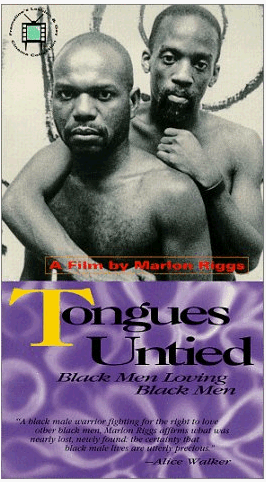 On this day in 1991, the groundbreaking film on Black Gay experience, Tongues Untied, was broadcast on national television in the United States. The director Marlon Riggs stated that the piece was created to
On this day in 1991, the groundbreaking film on Black Gay experience, Tongues Untied, was broadcast on national television in the United States. The director Marlon Riggs stated that the piece was created to
"…shatter the nation’s brutalising silence on matters of sexual and racial difference. [Tongues Untied] is partly about community-building. It’s an affirmation of some of the things that we as black Gay men take for granted. For example, lots of people snap. They snap on every syllable, and they don’t think about it. You can go from Mississippi to California to New York and this cultural form will be recognized-there will be a response. Some people are ashamed about snap because they look at it and think, ‘Oh, we know he’s a Gay man.’ Yet, snap is also a form of resistance, a form of saying, ‘Yes, I’m different and I’m also proud of it.’"
The national broadcast ignited a firestorm among the conservative Religious Right because of the film’s focus on Gay sexuality and its funding through a National Endowment for the Arts grant. Jesse Helms railed against the film from the floor of the U.S. Senate mistitling the film "Tongues United." Months later Patrick Buchanan, who was running against the first George Bush for the presidential nomination, cited "Tongues Untied" as an example of how President Bush was using taxpayer’s money to fund "pornographic art." He featured excerpts from the film in his political campaign commercials, curiously editing out any images of Black Gay men.
The Gay theorist and film critic Vito Russo wrote that "Usually, politically and socially admirable films fall short of the mark in the aesthetics department. They are praised more for their good intentions…Marlon Riggs has created that rarest of birds — a brilliant, innovative work of art that delivers a knock-out political punch." The film featured poetic and visual segments including the work of Essex Hemphill, Brian Freeman, Joseph Beam and many others.
The film would go on to win countless awards and accolades including Best Documentary Award at the Berlin International Film Festival, Best Independent Experimental Work by the Los Angeles Film Critics and Best Video at the New York Documentary Film Festival.
<<<<~~>>>>>
Today’s Gay Wisdom comes from Marlon Riggs:
"Frankly, with Tongues Untied if white heterosexuals don’t understand the reasons why black people are angry and just consider this piece militant, then so be it. I’m not going to take time to justify this for people for whom this experience is totally alien. Tongues Untied is an affirmation of the feelings and experiences of black Gay men, made for them by a black Gay man, or actually by black Gay men because the piece has a number of voices. If others understand, fine, but making sure everyone understands was not my prerequisite in making this."
— Marlon Riggs
"(The Christian Right says) Bring back the melting pot. Restore ‘traditional values.’ Re-institute prayer in schools. Preserve the primacy of Western civilization (the only one that matters anyway). And not least, protect that critical bedrock of American greatness: ‘the American family’ Such pronouncements reveal an intense, even pathological desire to perpetuate a thoroughly obsolete myth of America, and through this, a repressively orthodox system of sociocultural entitlement."
— Marlon Riggs
“My struggle has allowed me to transcend that sense of shame and stigma identified with my being a black Gay man. Having come through that fire, they can’t touch me.” – Marlon T. Riggs
Read a great interview with Marlon Riggs titled "Listen to the Heartbeat" here.
~ ~ ~
This entry was also this day’s Gay Wisdom email.
Sign up today to get our emails on Gay History and Wisdom!
Fugu & Takafumi
the only person
I know who ever
contemplated
poisoning me
is my friend
Takafumi
I was his guest
at a fancy restaurant
in Osaka
when he ordered for us
the most expensive dish
on the menu
an appetizer
of fried fugu fish
without telling me
in my memory
he continues
with chop sticks
dips in soy sauce
takes the first
bite of heaven
and offers me
the next
Franklin Abbott
13 July 2007
Stone Mountain
Rise Up & Shout! ~~~ AGAIN!
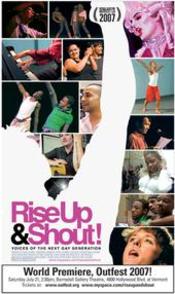 Last November, the Gay Men’s Medicine Circle of Los Angeles, under the guidance of a committee headed by Don Kilhefner, Malcolm Boyd and Mark Thompson produced a talent showcase entitled Rise Up & Shout!: Voices of the Next Gay Generation. The evening showcased a new generation of Gay and Lesbian artists, but more importantly it created an opportunity for an older Gay generation to interact in a supportive manner with a younger Gay generation, which, in addition to actually being able to learn from their elders, were probably introduced to the idea of “community elders.” A win-win situation for one and all.
Last November, the Gay Men’s Medicine Circle of Los Angeles, under the guidance of a committee headed by Don Kilhefner, Malcolm Boyd and Mark Thompson produced a talent showcase entitled Rise Up & Shout!: Voices of the Next Gay Generation. The evening showcased a new generation of Gay and Lesbian artists, but more importantly it created an opportunity for an older Gay generation to interact in a supportive manner with a younger Gay generation, which, in addition to actually being able to learn from their elders, were probably introduced to the idea of “community elders.” A win-win situation for one and all.
The evening, at the Barnsdall Gallery Theater in Hollywood, was presented as a benefit for White Crane Institute and was filmed by Brian Gleason. The documentary film he made premieres this week. We had an opportunity to speak with Gleason about his involvement in Rise Up & Shout!:
WC: Can you describe the Rise Up & Shout! project and tell us what attracted you to it?
Brian Gleason: Rise Up and Shout! is a two part project for me. The first part was my involvement with the intergenerational committee that created the idea, planned and successfully executed the event, Rise Up and Shout!, which was an evening performance by and for Gay youth that took place on September 9, 2006. Not long after my involvement with the committee, I came up with the idea of a documentary film project centered around the event, and began directing that effort, which continues, and has its most recent culmination in the film world premiere at Outfest, on Saturday July 21, 2007.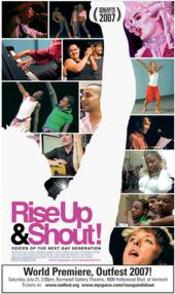
My interest in directing the documentary goes back to my move from San Francisco to Los Angeles in early 2004. I moved down to Los Angeles to work more closely with people like Don Kilhefner and Mark Thompson and Malcolm Boyd; three people who, to me, have really earned the title of elders in the Gay community. I started having phone conversations with Don and Mark a few years back, when I was still living in San Francisco, because I became so interested in their writings, where they spoke about the deeper roots of Gay history and culture and what it really meant to be Gay: that it was not just a sexual orientation but something much more, something that went back thousands of years in culture and art and history, surfacing in epics such as Gilgamesh, the writings of Plato, the work of Walt Whitman and others throughout the years.
Well, eventually I made the move to Los Angeles, and I have been working very closely with all three of these great men, and have formed very deep friendships with all of them. The idea initially came to me to interview them for some sort of book or video project, but then when we all started working on Rise Up And Shout!, it struck me that the most interesting aspect of this whole project was the intergenerational dialog that was occurring – that’s the theme, or the emotional "punch" that really hit me: finally I was experiencing Gay community: elders, adults and youth working together to help each other find their voice, to discover something valuable and lasting about themselves as Gay men. That became the focus and theme of the documentary, and I hope I’ve been able to adequately portray that in the film.
WC: Beautiful. It’s certainly a motivation White Crane understands. We’ve done a couple of issues addressing similar ideas, and worked closely with all the people you mention, too. I guess, in the interest of full disclosure for the readers, we ought to let readers know that White Crane Institute was a beneficiary of the event and I attended it. It was wonderful.
I suppose we all have ideas of what "intergenerational" dialog means. How difficult was it for you to assemble the cast you had? And what was the biggest surprise for you personally?
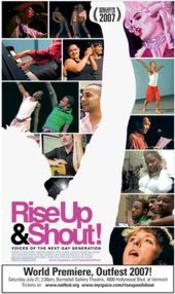 Brian: Assembling the cast literally took a year. We held something like three or four auditions, and most of the kids were quite talented, but it really became a matter of representing diversity of voice ‒ in other words, we didn’t want 15 opera singers, or 15 poets, etc. ‒ we needed a real mix to represent all the various voices in the Gay community. And we got it ‒ by the time we finished we had everything from glam opera to lesbian hip hop to classical poetry, film and everything in between – but this took everyone on the committee digging into all their email lists and their friends email lists and phoning and canvassing with audition posters. It was a hell of an effort, to put it mildly, but a fun and engaging one, and also one that harnessed every generation represented on the committee: some of the elders were able to find and audition the more classical acts: vocalists, etc., while some of the youth on the committee were able to find rappers, hip hop dancers and the like.
Brian: Assembling the cast literally took a year. We held something like three or four auditions, and most of the kids were quite talented, but it really became a matter of representing diversity of voice ‒ in other words, we didn’t want 15 opera singers, or 15 poets, etc. ‒ we needed a real mix to represent all the various voices in the Gay community. And we got it ‒ by the time we finished we had everything from glam opera to lesbian hip hop to classical poetry, film and everything in between – but this took everyone on the committee digging into all their email lists and their friends email lists and phoning and canvassing with audition posters. It was a hell of an effort, to put it mildly, but a fun and engaging one, and also one that harnessed every generation represented on the committee: some of the elders were able to find and audition the more classical acts: vocalists, etc., while some of the youth on the committee were able to find rappers, hip hop dancers and the like.
And there were a lot of surprises, most all of them working out really well. Jim Pentecost, a Broadway veteran, directed the show, and he knew all along that this was going to be a right-up-to-the-minute effort, and was able to keep us more or less calm throughout this whole process. I mean right up to a few weeks before the show, I think we had only sold like 8 tickets, and we wanted to fill a 300 seat house for the kids! But we did it. The biggest surprise for me personally was spending the afternoon interviewing Justin Miles, a 21 year old HIV positive poet, former drug addict and prostitute, who now lives with his Mormon parents in Simi Valley, has kicked the drug habit, and is pursuing a college degree. Justin opened right up to me, and was totally honest without being grandiose, and showed a wisdom way beyond his years. He talked straight up about the struggle with drugs, sex and love, coming out, trying to turn his life around and start anew ‒ all by the age of 21! He didn’t give me some sermon about the horrors of his past and how others should avoid this or that or do this or that, he simply talked openly about his situation, owned up to the choices he had made, talked honestly about his fears at the same time as his hopes for his future. It was really endearing and provocative, and if I’ve been able to capture just a little of that in the film then I’m happy.
WC: That’s a great story and pretty unusual for someone to be able to overcome the whole "poor me victimhood." What are some of the other stories that are in the film?
Brian: Well, another story, or I guess it’s more of a theme around which a few stories are wrapped, was the meetings, conversations and time spent together between some of the youth and elders. It’s funny, making a documentary, sometimes you capture moments that just happen and sometimes you "prime the pump" a little and see what happens.
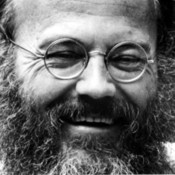 Well, sometimes the youth performers and the "elder" committee
Well, sometimes the youth performers and the "elder" committee  members from Rise Up just happened to run into each other, strike up a conversation, work together at rehearsals, etc. and sometimes I arbitrarily paired up the two groups. I did this with a couple of the performers but one in particular really struck me: I paired Steven Liang, an 18-year-old Chinese American Gay man who performed poetry readings with Mark Thompson, the producer of the Rise Up event and the former editor of the Advocate magazine. I had Mark give Steven a tour of his photojournalist career — Mark’s photos of people like Paul Monette and Robert Mapplethorpe and Ram Dass, Fellow Travelers, were hanging in a gallery in Silverlake, so I brought in Steven Liang and had Mark give him his own tour, when the gallery was closed. It was pretty incredible to watch Steven as he learned about these people — many of them he was not even aware of – and really got his first lesson in Gay culture and history. I realized how unavailable so much of our culture and history is to younger Gay people, and it became a real motivation for continuing to plow through all the difficulties and make the film.
members from Rise Up just happened to run into each other, strike up a conversation, work together at rehearsals, etc. and sometimes I arbitrarily paired up the two groups. I did this with a couple of the performers but one in particular really struck me: I paired Steven Liang, an 18-year-old Chinese American Gay man who performed poetry readings with Mark Thompson, the producer of the Rise Up event and the former editor of the Advocate magazine. I had Mark give Steven a tour of his photojournalist career — Mark’s photos of people like Paul Monette and Robert Mapplethorpe and Ram Dass, Fellow Travelers, were hanging in a gallery in Silverlake, so I brought in Steven Liang and had Mark give him his own tour, when the gallery was closed. It was pretty incredible to watch Steven as he learned about these people — many of them he was not even aware of – and really got his first lesson in Gay culture and history. I realized how unavailable so much of our culture and history is to younger Gay people, and it became a real motivation for continuing to plow through all the difficulties and make the film.
WC: Yes… we’re very familiar with Mark’s photos…White Crane is touring the exhibit around the country right now. It’s here in NY as we speak and it goes to Philadelphia and Washington D.C. next.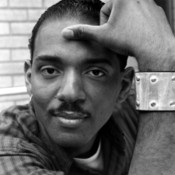
Brian: By the way, I use the terms youth and elders because I think, first of all, it evokes a good description of the intergenerational theme, but also because it’s the old tribal term, from back in the time when community was much more vital and youth and elders were always together, learning from each other and contributing back to the community. This is something that I think is really lost today, particularly for Gay people, since we come in this kind of Diaspora from towns all over the country into these cities where we don’t know each other, are separated in many ways from our families and original cultures, and have to quickly learn to adapt, get along and build a life, often very much alone.
WC: Who were your elders?
Brian: Well, as much as it sounds like a cliché, I’d have to say my Dad was my first elder. Of course it wasn’t always that way, growing up Gay and liberal in an Irish Catholic Republican family, but I’ll never forget one day when I was very young and tried to run away from home — Dad got very angry at first, but then I noticed him starting to cry, which he of course tried to cover up, and he ended up by saying "you’ll always have a place in my home, no matter what" and it turned out to be true over the years, and helped my coming out more than you can imagine. It’s ironic, as conservative as he was he taught me what acceptance really means.
WC: That’s actually very sweet, and I’m glad it was the first response you had. And who were your first Gay elders?
Brian: My first gay elders were Don Kilhefner, Mark Thompson and Malcolm Boyd. They were one of the big reasons I moved down to Los Angeles from San Francisco several years ago. When I was living up in SF, I called Don out of the blue one day, because I was having very strange dreams and I read an essay of his on dreams, so I Googled his name and found his number and to my surprise he picked up the phone and we talked for almost an hour. It was the first conversation I ever had where I really began to feel part of the larger Gay community — the cultural community that has fought for our rights over the years — and paved the way for an understanding that we are much much more than just a sexual orientation.
WC: Such as…?
Brian: We are, as Harry Hay put it, a separate people whose time has come, a people with a unique outlook on life and a significant contribution to make to world culture. Mark and Malcolm really welcomed me down here in Los Angeles, and without their support as friends and elders, this film would never have been made. The event, Rise Up and Shout, was essentially a year-long nose-to-the-grindstone effort that came out of a simple lunch between Mark and Don where it was decided to put on an event for gay youth. That’s grassroots community work, and people like Mark, Malcolm and Don have done it for decades now, and taught me that it’s our generation’s turn to take over and continue this vital work, to help gay people come together, build community and understanding, get over the homophobia and let the world know that we’ve come with a real gift to give the world — look at how many gay people are artists, healers, visionaries!
WC: In the Gay community, the problem seems to be one of opportunity with respect to that "Generation Conversation"…other than Rise Up & Shout! which was obviously a wonderful opportunity for everyone involved, I know Don Kilhefner has been making a lot of these situations happen. Have you worked with him on other projects?
Brian: Don and I have worked on several projects together, most notably the workshops for the group that he co-founded a few years back, the Gay Men’s Medicine Circle, a grass roots community organization here in Los Angeles that works with many gay men on issues such as HIV, crystal meth, and other psychological or spiritual aspects of their lives. The Circle has co-sponsored several major events, including Rise Up and Shout last year, and, a couple years back, the Standing On The Bones of our Ancestors conference, a weekend long seminar on the need for greater intergenerational dialog in the gay community. Don has been a professional mentor for me in my psychotherapy career, and has, more than anyone, taught me the importance of community, and what that word really means: that we gay men need to start assuming responsibility for each other.
WC: You’ve talked about Justin and Liang. Is there another favorite story in the movie you can talk about?
Brian: Sure ‒ it seemed like a little story at the time, and it kind of operated like a motif running just below the surface of the film, but when I started watching the footage I really noticed how Malcolm Boyd, 84-year-old priest and author and a member of the Rise Up committee, connected in a profound way with the performers and the other members of the committee. This event was really important for him, and it reminded me of something my Dad used to talk about: as he got older he really missed the opportunity to connect with the younger generations (outside his own children). I think everyone wants to give back in some way or another, but it reaches a kind of critical mass when you get older, and you really start to understand, and feel in a deep way, the connection between the generations and your role in that connection ‒ when that’s missing, as it really is in the modern world, I think it really affects the oldest generation (and also, in a profound way, the youngest generation) the most.
WC: Knowing Malcolm, that’s not hard to believe. His connection with this magazine has been a profound experience for us, too. Mark [Thompson], too. They’re both very passionate about the community of Gay men and their well-being.
So…the film premieres next week in Los Angeles [Rise Up And Shout!, will have its world premiere this summer at Outfest! Saturday, July 21, 2:30 at the Barnsdall Gallery Theatre 4800 Hollywood Blvd, Los Angeles, CA 90027 near Vermont] Is there anything that you wished you could have gotten that you missed? And, any final thoughts?
Brian: Well, I always feel like I missed something, I just think that’s part of the process. I love that Martha Graham quote, "No artist is satisfied. Ever." And I really feel it with this, my biggest artistic endeavor to date. It’s a strange, somewhat painful, somewhat wonderful feeling that keeps you going after that elusive "thing" in art, love, anything worthwhile.
As far as having missed anything specific, I’d say a couple things: I would have loved to have spent more time with the GLASS kids, but it was just impossible due to all the restrictions in the county youth foster system; and I would have loved to have followed all the kids more, found out what they are up to now, how they are doing after Rise Up and Shout, what impact it had on their lives – but I’m thinking maybe that will be the subject of my next documentary (he says, paying off credit card bills and trying to catch up on sleep)!
Final thoughts: let’s see, well, it’s been a real journey, and it is very true what people say who undertake projects like this: it almost kills you, and at the same time, it’s incredibly rewarding and makes you who you really are, and to me, that’s the whole point.
The Rise Up and Shout! event and film were put together by many hands in addition to Brian Gleason, including: Broadway director and producer Jim Pentecost, who directed the event Rise Up and Shout!, Don Kilhefner, Mark Thompson, Malcolm Boyd, Frank Rodriguez, Joey Shanley, Ethan Schvartzman, Virsil Mitchell, Elijah Cohen, Karen Minns, Kevin Yoshida, and all the members of the Gay Men’s Medicine Circle
Candle Light
I was just in Tennessee for a week, visiting with an old friend who is having some health challenges at the moment and seeing other friends I haven’t seen in more than ten years now. More on that later…
 One of those friends is John Wall. He is taking the most excellent care of my other friend. Without John Wall I don’t know what he would be doing. I went to visit John at his homestead by a stream. He shares this place with his fere, Lee, and they grow vegetables (Lee is a horticulturist at a local garden) and John Wall makes candles. Beautiful candles. His business, Dry Creek Candles, is his main form of support…and since he is giving such support to my old friend, I thought it would be nice if readers here gave John Wall and Dry Creek Candles a look. We all burn candles from time to time, and John’s are beautiful, hand-made, hand-dipped bee’s wax. And John is pretty cute, too.
One of those friends is John Wall. He is taking the most excellent care of my other friend. Without John Wall I don’t know what he would be doing. I went to visit John at his homestead by a stream. He shares this place with his fere, Lee, and they grow vegetables (Lee is a horticulturist at a local garden) and John Wall makes candles. Beautiful candles. His business, Dry Creek Candles, is his main form of support…and since he is giving such support to my old friend, I thought it would be nice if readers here gave John Wall and Dry Creek Candles a look. We all burn candles from time to time, and John’s are beautiful, hand-made, hand-dipped bee’s wax. And John is pretty cute, too.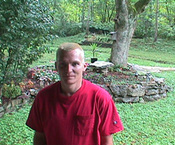 You know…for a guy.
You know…for a guy.
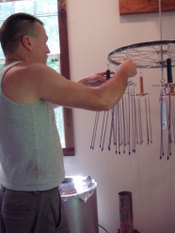 The work involved seems almost meditative. He works with beautiful colors, as you can see above, and he also made all of his equipment from scratch. Notice those wheels holding all the candles…they’re bicycle wheels.
The work involved seems almost meditative. He works with beautiful colors, as you can see above, and he also made all of his equipment from scratch. Notice those wheels holding all the candles…they’re bicycle wheels.
Turn and dip. Turn and dip. I asked him how many dips it takesto make a candle (and no…that’s not a set-up for a joke!) and he told me 35 or more. All his products are made with the least amount of additives to give you clean burning, long lasting, quality candles. Beautiful candles by a beautiful man. 
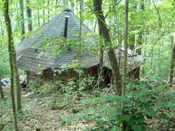 Most of the time I was there, we sat on the porch and caught up on a lot of conversation. My friend and I met 35 years ago in San Francisco and we haven’t run out of things to talk about in all that time. He’s built a wonderful little hermitage/cottage/Hobbit home for himself there. He’s not well enough to stay in it now. But we went to see it and while we were there, he gave me the most wonderful gift of these old flyers from the Fillmore West. Some of them are pretty amazing….Jethro Tull, Chicago (my home town!)…It’s A Beautiful Day…Ten Years After…the Grateful Dead…John Mayall. And more. All in the inimitable psychedelic style of the day.
Most of the time I was there, we sat on the porch and caught up on a lot of conversation. My friend and I met 35 years ago in San Francisco and we haven’t run out of things to talk about in all that time. He’s built a wonderful little hermitage/cottage/Hobbit home for himself there. He’s not well enough to stay in it now. But we went to see it and while we were there, he gave me the most wonderful gift of these old flyers from the Fillmore West. Some of them are pretty amazing….Jethro Tull, Chicago (my home town!)…It’s A Beautiful Day…Ten Years After…the Grateful Dead…John Mayall. And more. All in the inimitable psychedelic style of the day.
Here are some of them…
The amazing thing is he still had them at all. They don’t call it "ephemera" for nothing: It’s just paper…in a trunk…in the woods! This ephemera was mailed out to promote concerts at Fillmore Auditorium, but also to promote Bill Graham’s tours. 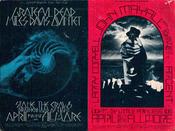 Most people probably tossed them or lost them at some point.
Most people probably tossed them or lost them at some point.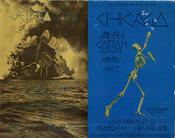 The calendars on the backs of these read like a Who’s Who of the Golden Age of Rock n’ Roll….Van Morrison…Joe Cocker…Crosby, Stills, Nash & Young,…John Sebastian…Richie Havens…Frank Zappa…Rod Stewart…and those are just the ones on the back of one of the flyers.
The calendars on the backs of these read like a Who’s Who of the Golden Age of Rock n’ Roll….Van Morrison…Joe Cocker…Crosby, Stills, Nash & Young,…John Sebastian…Richie Havens…Frank Zappa…Rod Stewart…and those are just the ones on the back of one of the flyers. 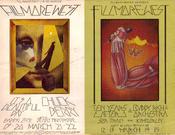
Bill Richardson’s and the Use of Maricon
Some of you may or may not have heard the flap about New Mexico governor Bill Richardson’s using the word "maricon" a few months ago on Don Imus’ show.
The clip is here:
Imus asks Governor Richardson if he agrees that "Bernard," that’s Imus’ sidekick, is a "maricon." Now Imus knows exactly what he’s doing. They’re both from the same part of the country and they think they’re having a cool little exchange. He knows that Richardson knows that maricon means "faggot" in the Spanish they both grew up around. Imus also knows that most listeners to his show have no idea what the phrase is. You notice neither of them defines the term for their listening public. Imus launches the idea and Richardson, you’ll notice he actually jumps at it. Actually, Richardson goes FURTHER. Imus just asks Richardson to answer yes or no. Richardson sort of enjoys saying it, calling Bernardo un maricon. There is NO hesitation in Richardson’s reply. I mean he’s not even thinking this is problematic. Imus and Richardson are playing on a keen perception that most listeners won’t know what the word is.
This would seem to be Richardson’s macaca moment. He, like Senator Allen, knew they were hurling an epithet. But frankly, in my opinion Richardson’s is probably worse. Because Allen was using a very obscure phrase while Richardson was using a term that anyone who grew up speaking Spanish recognizes it for what it is. I am pretty sure that people have died for using that term of disparagement. That people have had their masculinity challenged with that term or killed people for being "un maricon."
Richardson’s non-apology just exacerbates the situation. He claimed that when he was growing up the term "maricon" was a neutral term, not good or bad, it just meant "gay." This is such bullshit it staggers the senses.
Now I’ve been assured that Richardson has a great track record on LGBT rights. All I’ve heard in detail is that he added gay and lesbian and transgender to the Hate Crimes bill in New Mexico. All well and good. [Although may I add that if *that’s* your great accomplishment for LGBT rights, — the ability to have our murders by haters labeled for what they are — than the bar is set really, really, really low in this country].
There are some gay Latino bloggers writing about this and hopefully this will get the coverage it deserves. Because so far, it seems the humanity of gay people seems pretty low on the totem pole in this whole sad exchange. It hasn’t received much press at all.
Can I also express how personally wounding it is that the first Latino politician of some stature, a credible (if not financially viable) candidate for the presidency has to reveal himself to be so grossly out of touch to find this acceptable. I haven’t felt this distressed and disgusted since Alberto Gonzalez was trotted out as the "First Latino/Hispanic Attorney General." Double Sigh.
